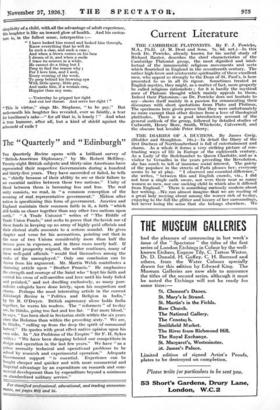The "Quarterly" and "Edinburgh"
THE Quarterly Review opens with a brilliant survey of "British-American Diplomacy," by Mr. Robert McElroy. Twenty-eight British subjects and thirty-nine Americans have represented. their respective Goiernments during a hundred and-thirty-five years. They have succeeded or failed, he tells us, " chiefly because of their ability to see or their failure to see essential unities between these two nations." Unity of blood between them is becoming less and less. The real unity consists, we read, in " a common conception of the meaning of real representative government." ,NWtion after nation is questioning this form of government. America and England maintain their common faith in it, a faith "which still holds us closer together than any other two nations upon earth." " A Trade Unionist " writes of " The Riddle of Trade Union Funds," and seeks to prove that the lavish use of these funds in keeping up an army of highly paid officials and their clerical staffs amounts to a serious scandal. He gives chapter and verse for his accusations, pointing out that in the case of two Unions considerably more than half the income goes in expenses, and in three cases nearly half. If peace and prosperity reigned, the writer continues, many of these well-paid officials " would find themselves among the ranks of the unemployed." Only one conclusion can be drawn from his argument. Mr. Martin Welsh contributes a charming article upon " Brother Francis." He emphasizes the strength and courage of the Saint who " kept his faith and carried his cross of self-sacrifice and love until his body failed and perished," and not dwelling exclusively, as many jour- nalistic eulogists have done lately, upon his magnetism and charm. Perhaps the most interesting article in the current Edinburgh Review is " Politics and Religion in India," by Sir M. O'Dwyer. British supremacy alone holds India together, he warns his readers. The " reformers " of to-day arc, he thinks, going too fast and too far. " Far more blood," he says, " has been shed in Sectarian strife within the six years since the Reforms than within the preceding sixty." We are, he thinks, " calling up from the deep the spirit of communal hatred." He quotes with great effect native opinion upon his own side. In " Air Problems of the Empire " Sir F. H. Sykes writes : "We hive been dropping behind our competitors in design and operation in the last few years." We have " as a Prime necessity technical and operational problems to be solved by research and experimental operation." Adequate Government support " is essential. Experience can be bought cheaper and quicker and with more commercial and Imperial advantage by an expenditure on research and com- mercial development than by expenditure beyond a minimum on standardized military service."


















































 Previous page
Previous page